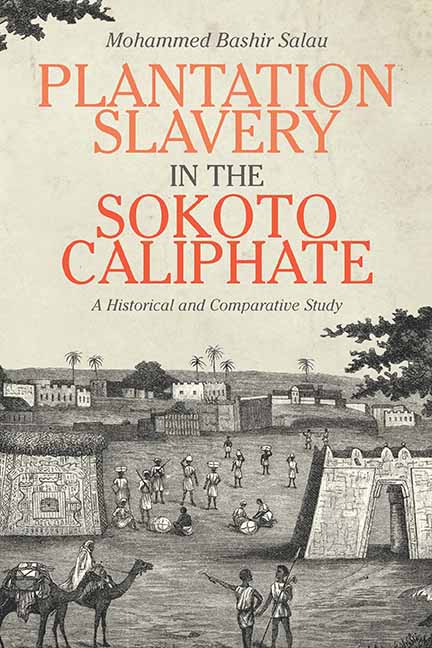Book contents
- Frontmatter
- Contents
- List of Illustrations
- Acknowledgments
- Introduction
- 1 Race and Slavery in the Sokoto Caliphate
- 2 The Roots of Sokoto Caliphate Plantations
- 3 The Course of Plantation Development
- 4 The Types, Structures, and Characteristics of Plantations
- 5 Observations on Slave Origins, Slave Resistance, and Labor Control
- 6 The Significance of Plantations
- 7 Plantations in the New World and in Coastal East Africa Compared
- Conclusion
- Notes
- Bibliography
- Index
- Frontmatter
- Contents
- List of Illustrations
- Acknowledgments
- Introduction
- 1 Race and Slavery in the Sokoto Caliphate
- 2 The Roots of Sokoto Caliphate Plantations
- 3 The Course of Plantation Development
- 4 The Types, Structures, and Characteristics of Plantations
- 5 Observations on Slave Origins, Slave Resistance, and Labor Control
- 6 The Significance of Plantations
- 7 Plantations in the New World and in Coastal East Africa Compared
- Conclusion
- Notes
- Bibliography
- Index
Summary
This study explores the development of plantation slavery in the Sokoto caliphate from its establishment in the first decade of the nineteenth century to its demise in 1903; it demonstrates that, although favorable climatic conditions supported the development of the plantation sector in the region, political elites were also instrumental in this development. The elites embraced Islamic practices and implemented policies which aided political and economic consolidation, and promoted the expansion of agricultural production done by slaves by encouraging the immigration of potential plantation owners, increasing the availability of slaves, distributing land to wealthy individuals, and tightening security, mainly through the establishment of ribats. Merchants were also important in the expansion of the plantation sector: by creating a market for goods such as millet, sorghum, salt, cotton, and indigo both within the Sokoto caliphate and outside it, they diversified the plantation sector.
While plantations grew largely in step with political and economic developments within the caliphate and in neighboring African states, plantation profits prior to the 1860s were also derived through indirect contact with both the Atlantic world and the Mediterranean region. As the nineteenth century progressed, investments in Sokoto plantations became more directly linked with European and global capitalist markets. Plantation slavery in the Sokoto caliphate, as elsewhere in Africa, did not develop without outside stimulus, as some have suggested. Nor, as others suggest, was it shaped exclusively by the Atlantic slave trade. Rather, evidence strongly suggests that, although interaction with European and Atlantic markets was a contributing factor in the development of plantations in the Sokoto caliphate, African factors were primarily responsible for the growth of the institution.
My focus on the relationship between jihad expansion and plantation development in the Sokoto caliphate confirms that, with few exceptions, the development of plantations took place in two main phases which corresponded with the phases of the jihad expansion. Plantations were also more numerous in Kano and other emirates which were relatively prosperous and politically stable.
This book carefully avoids one pitfall manifest in some earlier studies: ignoring labor regimes. My analysis indicates that plantation slavery encompassed gang labor under constant surveillance by overseers; slaves working side-by-side with their master or directly under his supervision; and slaves working on their own account on the condition that they paid rent or such other payments to the master.
- Type
- Chapter
- Information
- Plantation Slavery in the Sokoto CaliphateA Historical and Comparative Study, pp. 156 - 166Publisher: Boydell & BrewerPrint publication year: 2018



